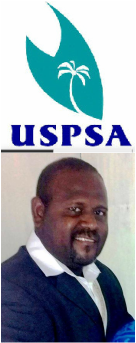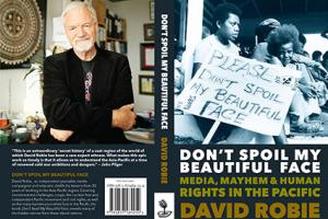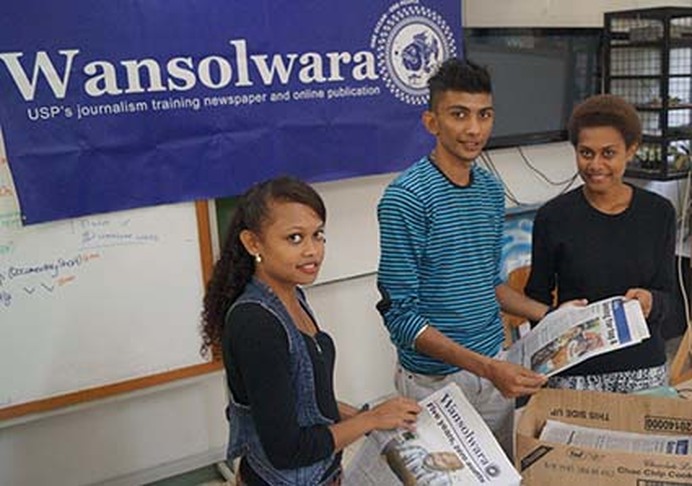 Saeni
Saeni Security authorities at the University of the South Pacific in Suva are investigating a report that the editor of the student newspaper was allegedly assaulted on campus for a report in the Wansolwara paper.
Editor Sonal Singh was allegedly assaulted by the President of the USP Students Association federal council, Whitlam Saeni for a report about the auditing of one of its affiliated body’s finances.
Singh alleges he was assaulted by Whitlam Saeni outside the library on Sunday evening.
“People are saying that youths should raise their voices against what is going wrong but now since we have raised our voice ,we are getting punched for it. what do people want from from this. So I am deeply disappointed with what happened. He was the president of USPSA and this was totally unexpected from him."
In a written statement given to FBC News, Saeni said there was no assault as alleged by Singh.
He added it was a ‘cultural and psychological issue.’
He says he tried to correct Singh about the article which was not verified and he did not give permission to use his photograph.
Saeni says he raised to Singh’s face -‘the normal thing he did with Melanesian friends.’
USP has confirmed receiving a complaint in regards to an assault and investigation into the matter has commenced in adherence to the university policies.
A statement says the parties that were involved will be informed of the outcome .- See more at: http://www.fbc.com.fj/fiji/28651/usp-investigates-student-editor-assault-claim#sthash.yCOa8sVc.dpuf
SELF-CENSORSHIP or SLACKNESS? We note that to date the Fiji Media has NOT reviewed (apart from Wansolwara) David Robie's book Don’t Spoil My Beautiful Face: Media, Mayhem and Human Rights in the Pacific. Although it came out last year it is astonishing that Fiji media has not reviewed the book in spite of the ongoing issues confronting the Pacific addressed in Robie's book. Another classic example of self-censorship in Fiji? In some respects DSMBF is a sequel to Robie's earlier book Blood On Their Banner
 Professor Robie
Professor Robie "This book is a compendium of writings by David Robie and is a reflection of his long and eventful career as a journalist, media educator, political commentator and human rights activist in the Asia-Pacific region.
There are expats who opt for patronising accounts of the realities that they have been part of and others who have intentionally learned from the communities that they have been privileged to be a part of.
Thankfully, Robie belongs to this latter category. It is difficult to understand the Pacific precisely because of its extraordinary diversity, but also because there is a paucity of information on the realities of life in the Pacific.
David has tried hard to set that record straight and this book is a reflection of the reporting of key events that have shaped the Pacific – from the struggles related to the decolonisation of New Caledonia to the 1985 bombing of the Rainbow Warrior (on which Robie incidentally was still on board two days prior to the bombing), the political economy of the media in the Pacific in particular in Fiji, the travails of media education in the Pacific and the general volatility in the region caused by economic and political instability and the impunity with which colonial and neo-colonial relationships continue to shape the Pacific.
The writings are important historical accounts of the shaping of Pacific nations caught as they are between their own internal ethnic complexities on the one hand, and external drivers of change on the other, who quite often deal with the symptoms and not the causes, thus opting for the "dependency" model and band-aid solutions.
It is extraordinary that David has been writing about climate change and nuclear fall-out refugees in the Pacific perhaps for much longer than anyone other journalist. The stories on the nuclear crisis include textured accounts of the lives of ordinary people who were mere pawns in the context of French nuclear testing in the Pacific and who endured humanitarian tragedies that were scarcely reported in the rest of the world.
That David covered such stories with an eye for detail and commitment to truth-telling is one of the strengths of this volume.
While the book includes accounts of struggles in the Philippines, Timor-Leste and Fiji, it also includes a very interesting section on the status of, and the challenges faced by journalism education in the Pacific.
Having been involved in assessing the programme at the University of the South Pacific, Fiji, I am familiar with David’s critique, in particular, the lack of enabling environments supportive of journalism education in the Pacific.
The volatility in the region shapes all enterprises including the practice of journalism and David’s account clearly reveals the consequences of this continuing uncertainty on both the practice of journalism and journalism education in the region.
 Pradip Thomas
Pradip Thomas DSMBF is available in Fiji: http://uspbookcentre.com/store/merchant.mv?Screen=PROD&Store_Code=UBC&Product_Code=9781877484254&Category_Code=NR


